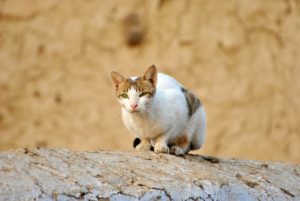Keeping Your Cat Inside or Outside: Pros and Cons

Felines are one of the most popular pets for many owners to adopt. Some homes allow their cat to choose whether it wishes to be an indoor or an outdoor pet. Since cats are very intelligent, carnivorous, and one of the best hunters; they could live either way. For owners, it is good to be knowledgeable about the positive and negative aspects allowing your cat to be either an indoor or outdoor kitty.
Here are some pros for having an outdoor cat:
1. Outdoor Cats Require Less Work.
An outdoor cat tends to be less dependent on its owner. When in the outdoors, a cats may learn how to adapt in ways for it to survive – therefore reverting into their carnivorous nature. As Best-Cat-Art.com says, outdoor cats could start to independently find food such as mice, rats, bunnies, and some birds, reducing their dependency on their owners for food. Outside cats also use the outdoors as their bathroom, which can make it easier on the owner because there are no litter boxes in the house to constantly clean. This helps if there is an unlocked “dog door” at all times so the feline can come and go as it pleases outside to do its business. So, outdoor cats are certainly a blessing for owners who prefer a more independent pet as opposed to a dependent pet relying on the owner for everything.
2. Outdoor Cats Are More Athletic.
Because of all of the activity involved with being outdoors, most outdoor cats are more athletic in comparison to strictly indoor cats. This allows for the obesity rate of outdoor cats to be much less than that of indoor cats. When in the outdoors, cats must be able to jump, run, climb, and defend themselves. Americanhumane.org relays that this causes the animal to be more athletic and stronger.
 Here are some cons for having an outdoor cat:
Here are some cons for having an outdoor cat:
1. Outdoor Cats Are More Likely To Get More Medical Issues.
The outdoors may be fun and a lot of exercise for an average feline pet, but there are also numerous dangers lurking around such as infectious diseases, parasites, and even poisons. Outdoor cats have shorter lifespans that that of an indoor cat says Catser.com. They are not immune to eating various animals or vegetation that could harm them or make them severely ill. Aside from rabies from other animals, there is the risk of an outdoor cat developing an intense flea/tick problem that can be fatal as well as developing parasites in their stomachs from ingesting animals that could have had parasites already.
2. Outdoor Cats Have A Tendency To Be Less Friendly.
Cats.org says that if a cat is left to become an independent hunter and fend for themselves, outdoor cats are more likely to have aggression issues and be less likely to be a friendly family pet. While some cats that go outdoors continue to be cuddly and friendly, some may find their “wild side” and become dangerous and shy to humans. This is simply because in the outdoors cat’s instincts are on full alert. Not all outdoor cats will be less friendly, but the majority of cats that tend to frequent outside show to be slightly more irritated by human touch, more prone to go into hiding if let inside the house, and more likely to refuse cuddling or being picked up.
Here are some pros for having an indoor cat:
1. Indoor Cats Are Safer Inside Of A Household.
Inside, cats have a higher lifespan due to the protection they have being kept inside. When cats are indoors, they have an extremely low chance of getting rabies, fleas and ticks. Besides parasites or diseases, they would also be safe from other predators that can threaten them if they were outdoors. Inside cats are more likely to be given direct medical care if necessary whereas outdoor cats hide their illnesses easier because the owner likely does not see them all of the time. This allows for indoor cats to get treatment they need quickly. The lifespan of an indoor cat can range from eighteen years of age to about twenty due to the safety and medical care it can be given, but outdoor cats have a lifespan of ten years of age to thirteen according to Vetinfo.com.
2. Indoor Cats Are More Likely To Be Friendlier Pets.
Because they are domesticated pets, indoor cats are more likely to become friendlier with humans, their owners especially, if kept in a steady, maintained home environment. Indoor pets are more relaxed, less aggressive due to the basic denaturing of their normal carnivorous nature if they were outside cats. From only being around humans inside of the household, indoor cats do not have the adrenaline rush from hunting, chasing, and killing animals in the outdoors where they are considered free. Northwoodpet.com states that indoor cats are much more affectionate than outdoor cats too because they are much more dependent on their owners for food, comfort, and luxuries.
 Here are some cons for having an indoor cat:
Here are some cons for having an indoor cat:
1. Indoor Cats Can Become Overly Dependent On Their Owners.
Because they have likely never had to need to be entirely independent by themselves, indoor cats are certainly more dependent on their owners than outdoor cats would be. Sometimes, though, indoor cats can become overly dependent on their owner for everything. It is common for most indoor pets to follow their owners around the house, meow for their food, and beg – in some cases – for attention because they have become overly dependent on their owners for everything. Lifewithcats.com says that an indoor cat is likely more independent if it is confident with jumping or climbing furniture in the house or free feeding the cat in order to allow for the cat to know food is always available and they can independently eat it whenever they want.
2. Indoor Cats Can Become Restless.
Indoor cats tend to become restless many times while living in a household. This is because they do not have space to run, enough entertainment in the home, or actively watch wild animals outside of the windows and want to go outside too. Thedailycat.com suggests giving the indoor cat more toys to play with inside or potentially adding more felines to the family to help entertain each other when their owners leave the house and are not available to play with them. Even allowing the cat to go outside every once in a while to relieve their pent up energy, similarly to how dogs do, can help an indoor cat be less restless while within the home most of the time.
Is your cat an indoor or outdoor cat? Why? Leave a comment and let us know!
